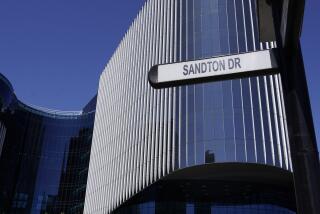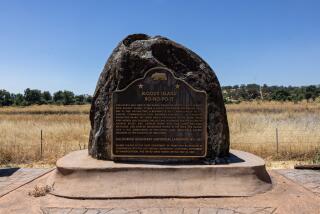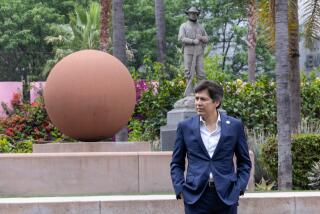After battle, Portland renames street after Cesar Chavez
The chanting started at the front of the church, a full-throated belt from a man pumping his fist from behind the lectern.
Si se puede! Si se puede! Yes we can! Yes we can!
The sound moved in a wave to the back, pew by pew, as scores of people chanted back, many pumping one fist and using the other hand to wipe away tears.
Just below the man sat the reason for their chanting: a huge representation of a street sign, 7 feet long, 2 feet tall, green with white letters reading “Cesar E. Chavez Blvd.”
Three years. That’s how long it took to get a street here renamed after the labor leader and human rights activist. The supporters never thought it would take that long. But it did.
“This has been horrible,” said Marta Guembes, co-chairwoman of the Cesar E. Chavez Boulevard Committee.
Take the effort to Tijuana or Mexico City, said others.
Renaming the street would “open up the border,” some predicted.
Such sentiments were the minority, but the words cut deep. “It turned ugly,” said Sonny Montes, a member of the committee.
A key dispute: Why not rename a park or bridge? But the committee wanted a street. Martin Luther King Jr. and Rosa Parks each had one, as did local developer and civic leader Bill Naito.
Finally, after much dispute, the City Council voted 5 to 0 last July to rename 39th Avenue -- a seven-mile stretch that passes about 650 homes and upscale stretches.
“Having been through three of them, street renamings are inherently one of the most controversial things a city can go through,” Portland Mayor Sam Adams said.
Civic leaders involved in the debate spoke at the Central Catholic Church on Jan. 29, the day the first sign would be unveiled. William Schneider, a chiropractor whose office is located on 39th, had spearheaded the opposition group for financial and historical reasons. He liked the history of the street and didn’t want his business address to change.
His e-mail list had about 150 people opposed to the new street name, mostly for similar reasons. But the motivations of some people who attempted to join his group disturbed him.
“The people I talked to, some of the racism I saw, I was pretty astounded,” Schneider said.
In retrospect, the fight seemed out of character for Portland. “I would not have guessed this would happen here,” Schneider said.
Said Adams: “Portland is a progressive city, but not, clearly, without its vulnerabilities around issues of race and racism and phobias and discrimination and stereotyping.”
Carolyn Leonard, who co-chaired the committee that renamed a street after King, said, “The sadness is this really shows how white Oregon is -- that people don’t know how to live with diversity.”
Portland is one of the top five whitest metro areas in the country, according to a 2007 Census Bureau survey. With 78% of its 2.17 million metro area population being white, it’s even whiter than Salt Lake City.
After the comments in church, everyone headed outside, where the first sign waited, cloaked in gold cloth, at the corner of Southeast Stephens Street and the soon-to-be Cesar E. Chavez Boulevard.
An overcast sky looked down though the skeleton branches of an overhanging cottonwood tree. People clung to their jackets in the cold wind.
Then the people pulled the cloth away, and a cheer rose, as did a cluster of balloons into the sky. Many in the crowd, including Schneider, smiled.
The chanting started again. And many wiped their eyes again, including Guembes.
“We went through so much,” she said.
Someone reminded the crowd that cake and punch waited inside the church, but many stayed, just looking up at the sign. Another car passed, but then stopped in the middle of the street, and a Latina woman leaned out the window. “Si se puede!”
“Si se puede!” they chanted back. “Si se puede!
On her way home, Guembes passed another Chavez street sign a few miles away. She cried, again.
baxter.holmes @latimes.com
More to Read
Sign up for Essential California
The most important California stories and recommendations in your inbox every morning.
You may occasionally receive promotional content from the Los Angeles Times.










